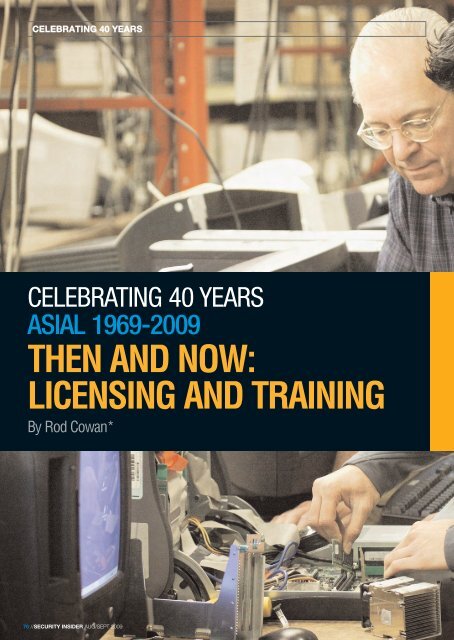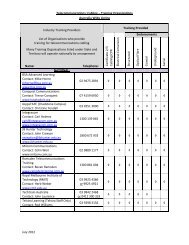Then and Now - ASIAL Australian Security Industry Association
Then and Now - ASIAL Australian Security Industry Association
Then and Now - ASIAL Australian Security Industry Association
You also want an ePaper? Increase the reach of your titles
YUMPU automatically turns print PDFs into web optimized ePapers that Google loves.
CELEBRATING 40 YEARS<br />
CELEBRATING 40 YEARS<br />
<strong>ASIAL</strong> 1969-2009<br />
THEN AND NOW:<br />
LICENSING AND TRAINING<br />
By Rod Cowan*<br />
76 //SECURITY INSIDER AUG/SEPT 2009
THEN AND NOW: <strong>ASIAL</strong><br />
<strong>Security</strong>, in its infancy, had little in the<br />
way of licensing, with security<br />
operatives lumped in with private<br />
investigators <strong>and</strong> debt collectors under<br />
various private inquiry agents‚ acts.<br />
Until well into the 80s’ obtaining a licence was as simple as<br />
filling out a form’ paying a fee, <strong>and</strong> taking it to a local licensing<br />
sergeant at times a case of VB could expedite matters after<br />
which you could strap a gun to your hip <strong>and</strong> protect premises,<br />
go on patrol <strong>and</strong> provide cash carrying services; businessmen,<br />
such as caravan park owners, were known to some to carry<br />
concealed .357 Magnums for “personal protection”.<br />
NSW was the first State to enact industry specific<br />
legislation, when the then police minister, Peter Anderson (now<br />
head of Macquarie University’s Centre for Police, Intelligence,<br />
<strong>and</strong> CounterTerrorism), introduced the <strong>Security</strong> (Protection)<br />
<strong>Industry</strong> Act 1985.<br />
At association <strong>and</strong> institute meetings, the talk was of the<br />
lack of consultation with industry claims Anderson rebuts but<br />
the big question being whether there would be a gr<strong>and</strong>father<br />
clause allowing those who had been in the industry for some<br />
time to skip the required two days training (with an additional<br />
day for firearms). As it happened, many security officers<br />
welcomed the training, saying it helped them underst<strong>and</strong> the<br />
job <strong>and</strong> their legal rights much better. Far from the new<br />
licensing requirements sounding the industry’s death knell, as<br />
predicted, it spawned a whole new industry in security training<br />
only a few companies offered such training before <strong>and</strong> a new<br />
revenue stream for off-duty coppers working as trainers or<br />
running their own training companies. Course material had to<br />
be approved by the police licensing branch <strong>and</strong> run by a<br />
sergeant (who said his qualifications for assessing training was<br />
his training as a fitter <strong>and</strong> turner).<br />
The next major turning point came in the mid 90s’ when<br />
<strong>ASIAL</strong>, mainly through the work of its then president Larry<br />
Circosta, developed a sophisticated model of co-regulation.<br />
continued page 78><br />
SECURITY INSIDER AUG/SEPT 2009// 77
THEN AND NOW: <strong>ASIAL</strong><br />
1960s > 1970s > 1980s > 1990s<br />
Circosta’s success in getting the attention of regulators helped<br />
at a Federal level by South <strong>Australian</strong> senator, Nick Minchin, son<br />
of <strong>ASIAL</strong>’s first president, Devon Minchin was highlighted in<br />
1996, when he presented plans for industry regulation to a<br />
national meeting of chief police officers, which were met with<br />
nodding approval.<br />
By now, a hotchpotch of laws <strong>and</strong> regulations had developed<br />
in all eight <strong>Australian</strong> jurisdictions, with NSW, SA, <strong>and</strong> WA<br />
providing the most comprehensive licensing regimes, while<br />
other States <strong>and</strong> Territories overlooked key areas, such as<br />
locksmiths <strong>and</strong> alarm monitoring centres.<br />
A 1997 NSW Act, based on the <strong>ASIAL</strong> co-regulation<br />
model, including a Master Licence scheme with m<strong>and</strong>atory<br />
membership of an accredited industry body (seen as a core<br />
element in ensuring compliance <strong>and</strong> st<strong>and</strong>ards), was hailed<br />
as ground-breaking, attracting international attention <strong>and</strong><br />
praise from delegates from as far afield as the US, UK,<br />
Denmark <strong>and</strong> China.<br />
The wheels began to wobble, however, when under the guise<br />
of competition, non-security associations were allowed to apply<br />
for accreditation by late 1999 there were 10 such bodies.<br />
<strong>Then</strong>, despite the success of security operations for the<br />
Sydney 2000 Olympics, including temporary licensing schemes<br />
<strong>and</strong> close co-operation between police <strong>and</strong> private security,<br />
goodwill towards the industry quickly dissipated. Media<br />
reporting of assaults, criminal activity, poor st<strong>and</strong>ards, <strong>and</strong><br />
incompetency reached a crescendo in 2004, with the death of<br />
cricketer David Hookes during an altercation with a door<br />
controller outside a Melbourne pub, <strong>and</strong> a Sydney cash-intransit<br />
guard shooting a robber fleeing the scene. In both cases,<br />
the security personnel were found not guilty in subsequent<br />
prosecutions. Nonetheless, negative reports continued<br />
unabated. In Adelaide, authorities voiced concern over bikie<br />
gangs allegedly infiltrating the nightclub scene, selling illegal<br />
drugs, laundering money <strong>and</strong> stirring up violence. Numerous<br />
firearms thefts from security guards prompted the NSW Premier<br />
Bob Carr to push for“vigorous reform” of the industry, telling<br />
ABC radio:“I‚ve got no respect for the security industry with my<br />
full support, the police minister, John Watkins, has been treating<br />
them pretty roughly I think the way they’ve h<strong>and</strong>led weapons, for<br />
example, the sort of security they’ve applied, has been<br />
shameful.<br />
The inevitable response was for politicians to order wholesale<br />
reviews of security legislation, resulting in ongoing amendments<br />
<strong>and</strong> changes to laws. Such changes had little consistency, <strong>and</strong><br />
created all manner of practical difficulties, such as in<br />
photographing, fingerprinting, <strong>and</strong> record checks slowing to<br />
bring outst<strong>and</strong>ing applications to unacceptable levels.Tensions<br />
between regulators <strong>and</strong> industry began to grow.The Victorian<br />
licensing regime, for example, with its dual system licensing for<br />
some, registration for others was described by <strong>ASIAL</strong>’s President<br />
78 //SECURITY INSIDER AUG/SEPT 2009<br />
<strong>Security</strong> is still not there, yet. But if on track, COAG’s<br />
efforts around security guarding could see st<strong>and</strong>ard<br />
licensing categories, probity checks, competencies,<br />
skills, <strong>and</strong> mobility in force by January 2010.<br />
as “ill-considered, unworkable <strong>and</strong> driven politically”.<br />
While the pugnacity of <strong>ASIAL</strong>’s former CEO,Terry Murphy, has<br />
since given way to its current CEO Bryan de Caires’s consensus<br />
building approach, <strong>ASIAL</strong> continues to work with States <strong>and</strong><br />
Territories towards creating nationally consistent co-regulatory<br />
models of licensing.<br />
But, federal mutual recognition activity could well see the<br />
most far-reaching changes.<br />
Already, in 2005, a special meeting of the Council of<br />
<strong>Australian</strong> Governments (COAG) on counter terrorism had put in<br />
train a raft of changes, affecting CCTV, monitoring, training <strong>and</strong><br />
licensing.<br />
Based on the Mutual Recognition Act 1992, which enables<br />
ministers from two or more states or territories to jointly declare<br />
occupations equivalent, <strong>and</strong> the conditions needed to achieve<br />
equivalence, a February 2006 COAG meeting agreed to new<br />
measures to enable people with trade qualifications to move<br />
more freely around Australia, without additional testing <strong>and</strong><br />
registration, saying full mutual recognition of vocational licences<br />
should be in place by December 2008.<br />
<strong>Security</strong> is still not there, yet. But if on track, COAG’s efforts<br />
around security guarding could see st<strong>and</strong>ard licensing<br />
categories, probity checks, competencies, skills, <strong>and</strong> mobility in<br />
force by January 2010.<br />
Which would be, after all, only 10 years longer than any real<br />
progress on a national railway gauge.



